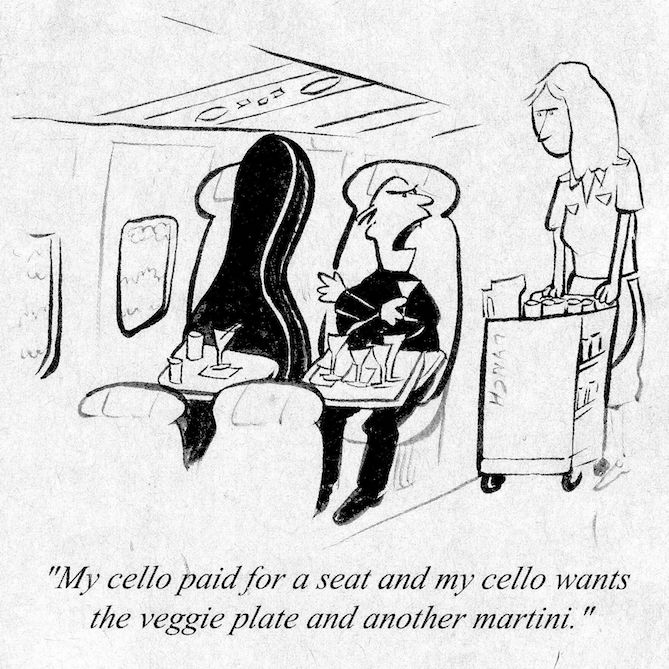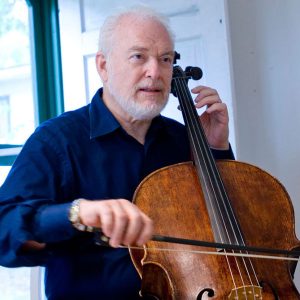
Best Public Response Letters to WestJet Bumping the Cello
Paul Katz
I want to thank the 200 or so people who have emailed me in support of my dispute with WestJet Airlines and I apologize if your comments were not used below. Don’t want this blog to be too, too long! Only 1 email was critical of me and I include it below. The responses are worth reading…illuminating, useful…and a couple are hilarious!
—Paul Katz
——————————
Dear Paul,
I felt absolutely sick when I read your story. I am a flight attendant for XXX Airlines and my husband a Captain of 32 years. I am dumbstruck by the stupidity of airline staff and ultimately airline management when it comes to the handling of priceless instruments on flights. Our twins, a cellist and violinist, experienced similar treatment at the Canadian National Music Competition in Fort McMurray, Alberta three days ago. Despite many pleas to management to give the Fort McMurray station a heads up about the festival and the onslaught of musicians arriving and departing as well as stations down line, nobody knew anything, and my husband and I had to plead on the telephone for our son to hand carry the cello to aircraft, and have the guys gently carry it down. We also paid full fare! It’s utter stupidity and absolute negligence and I’m embarrassed by it all.
Our family had the pleasure of hosting two members of the St. Petersburg Quartet overnight and the cellist shared a horror story of the quartet being kicked off a British Midland flight because they tried to put the violins and viola in the overheads!
A couple of months ago I had the young Canadian violinist, Timmy Choi on my flight from Philadelphia where he studies at the Curtis Institute. He has been loaned another fabulous Guarneri and I leapt up when someone tried to put a hat in that bin!
I am writing to the President and CEO of my airline and will enclose your article. I am sorry for the horrible treatment you received and I am going to make it my mission to educate flight attendants, pilots, ramp, sales agents and MANAGEMENT with regards to how serious this issue is, how expensive an accident can be and ultimately how damning it can be to an airline’s reputation.
With regards to posting (this letter) please don’t mention my airline by name as any public criticism by employees is met with an immediate pink slip.
-(Name withheld by request.)
—
I read the Boston Globe article about your travel nightmare. I too am afraid of flying with my cello. I despise Westjet (being Canadian it is one of the main choices for travel I have). Air Canada has been wonderful in selling me a seat for the cello. What logic is there in honestly buying a seat for a cello, which the airline will sell you, only to have it taken away by a management idiot? I sweat until the plane has taken off. I will never forget arriving in Boston one year and watching my cello, hand carried to baggage in Toronto, come out the conveyor belt on it’s face. Not a Guarnerius but nevertheless…
I hope that somehow the airlines can be made to see common sense and abide by their actual ticket sales.
I never fly Westjet voluntarily on principle.
-Gordon Cleland
Principal cellist, Niagara Symphony
—
I read your article, Traveling With My Cello… with great interest. It was especially fascinating that you wrote this while living it, filled with tremendous anxiety . I have heard stories of the difficulties of traveling with string instruments (my son is in a string quartet and the first violinist once had to hold his violin & bow in his lap during a long flight as they would not allow the case on).
-(Name withheld by request.)
—
Your outrage at WestJet as a result of the ‘no fly’ rule for cellos is completely unfounded. I am no lover of airlines since I have had my share of problems but it your responsibility, not the airlines, to determine what (and what cannot) be allowed to be carried in the passenger compartment. You most likely booked the flight with AA so if anyone should receive the brunt of your fury it should be them. I understand that a rare instrument is irreplaceable and even the toughest shipping container cannot provide adequate protection in certain circumstances but if you want to get from point A to point B by airline, take the time to learn about code sharing since in this day-and-age most major airlines hook up with other extra-national carriers in order to expand their range. I mostly book with Air Canada but often find myself stuck on some God awful United flight in the process.
-Alexander Deventer
—
Paul Katz: Thanks for the opinion, but of course, from my perspective, an airline should not sell a seat that it will not honor. All airlines have managed to program their computers to root out frequent flyer accounts using the name “cello”, so if WestJet wants to refuse cellos (which in itself is an indefensible policy), at least they should program their computers to reject the attempt to buy the ticket. And anyway, what’s different about WestJet’s airplanes or their seat belts, that they cannot take an instrument? But I appreciate for courage in writing to me and will post your opinion if you give permission. It’s good for we cellists to hear that there are other opinions.
—
Hi Paul,
Great and scary article! I once had a similar experience on a quartet tour in South America where a troublesome stewardess (in those days!) spotted my cello in its purchased seat (bulkhead seat by the window) and told me I had to check it. Showing her the ticket did nothing to dissuade her, and she went to ask the captain, and brought him to look at my “dangerous cargo”!
He agreed with her, and I was forced to check it for a stop-over flight from Honduras to Miami and then to NYC. There was only a bit of bridge movement at the other end, but I was near panic for the whole flight!
One of my pupils booked a flight from KC back east on US Airways and she borrowed a BAM flight case to check the cello for the flight. US Air told her that they would not check a cello under any circumstances and she was forced to leave the case there and buy a $600 seat for her cello, money that she did not really have!
I thought that new regulations were now in place governing instruments in planes, but apparently they don’t cover all possibilities. Thanks for the article, Paul!
-Carter Enyeart
Rose Ann Carr Millsap/Missouri Distinguished Professor
UMKC Conservatory of Music & Dance
—
Mr Katz,
Thought I’d send this to you, (which I submitted to’the Boston Globe.) My husband, a retired pilot, was equally appalled.
Having been a flight attendant for a legacy carrier for 25 years, I am quite familiar with the sight of musical instruments in the cabin. The only rule was that they should be strapped into a window seat (not an exit window, of course), so as not to block egress from that row in an emergency. It never caused a problem. I fail to understand, especially with the fattening of America, how a seatbelt designed to hold a human who would weigh far more that an instrument, would not hold the instrument. Some bureaucrat was not thinking clearly when creating this senseless rule.
This does not even address Mr. Katz having bought a seat for his cello under false pretenses, or the ridiculous lack of uniformity of regulations among carriers. AA should have informed him of the problem at the outset.
I really felt for Mr. Katz. To surrender a Guarneri cello to a chancy voyage in the aircraft hold must have been terrifying. One can only hope that someone comes to his senses soon.
-Sandra Wolff
—
Dear Paul,
A friend forwarded me your hair raising cello travel story. I have had two major damages to my cello (not as valuable as yours but nevertheless heart breaking). That was enough. Now I play a Luis&Clark carbon fiber cello and travel with a BAM double case that gives the cello excellent protection. The wooden instruments barely leave the house now. Thought I’d share this with you.Thanks, and safe travels.
-HANS CHRISTIAN
—
Dear Mr. Paul Katz,
I am very sorry to read your article of experience in A.A.
I think your nice performances should not be limited by economic view points of air companies. I would like to tell you another nightmare- Japanese female violinist HORIGOME Yuzuko’s Guarneri del Gesu was confiscated in Frankfurt Customs. She was ordered to pay $237,500 for getting back.
If possible, I would like to spread this terrible affair through you, Mr. Katz. It has been unhappy for both great players and music lovers!
http://www.rawstory.com/rs/2012/08/22/german-customs-demands-500000-from-japanese-player-for-violin/
Sincerely yours,
-HATANO Hiroshi
—
Dear Paul,
As a professional violinist I want you to know that I share your panic when travelling by air. Even though I play a small instrument, I have, over more than 30 years of touring, had the experience of having to fight for my violin to be on the plane with me and not tossed into baggage. I have also had to fight with employees trying to open the case and “look at” the instrument, as though it might be dangerous…
My sympathies to you–and I will be careful to avoid the airlines you mentioned.
-(Name withheld by request.)
—
Hi Mr. Katz,
It was so horrible to read about your experience most recently flying with WestJet with your cello. I can’t imagine all of the horrors going through your mind during that flight, and the sense of relief when you got to your destination and everything was ok. Musicians should never be second-classed in this way with the tools of our trade. It is completely unacceptable. I’m hoping that some bodies, perhaps including the AFM who have been so tirelessly working to get violins and violas approved as overhead baggage (which they thankfully recently succeeded at in congress), can assist in making it discriminatory to deny a cellist the ability to purchase a seat (Aka, travel at all) with their cello.
I just wanted to drop a line and thank you for taking the time to share your story. I make most of the air travel arrangements for the Criers, and it’s always helpful to know which airlines to steer clear of and which to avoid entirely. WestJet now joins the ranks of USAirways for us on our Crier no-fly list.
Wishing you all the best from the Criers!
Jason Fisher, violist
Artist Management Liaison
A Far Cry
—
It is with utter relief that I read the last few lines in the Boston Globe G section that your cello was all right. While reading, I was having nightmares about the soundpost having stuck half of itself out of the back, and the fingerboard lying loose.
(I’ve grown up around chamber music, hearing it live since I was 5 years of age.)I consider the airline’s statement of “the seats are not engineered for musical instruments” (in so many words), to be nothing short of a dodge.
I think that maybe, if the jet had encountered turbulence, that if a passenger had lost his/her balance, that the neck and scroll of the cello might be in jeopardy.Still I am SOO relieved that both you AND “Miss Cello” are all right.
– Anonymous Chamber Music Fan
Subjects: Travel
Tags: airlines, American Airlines, cello, cellobello, FAA, FAA passenger bill of rights, height restrictions, Katz, media, musicians, news, passenger rights, Paul, regulations, restrictions, rules, safety, size, space, stowage, Travel, travel with instruments, traveling with a cello, weight, WestJet
